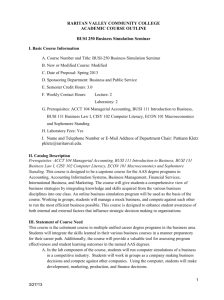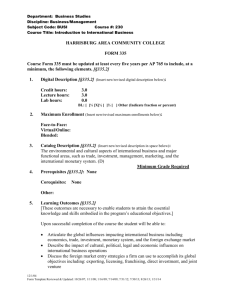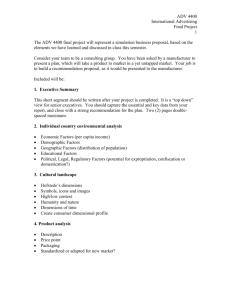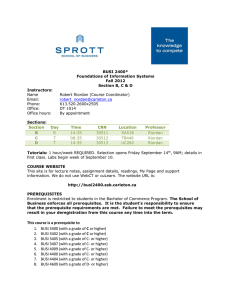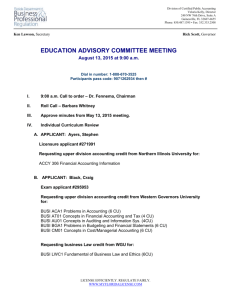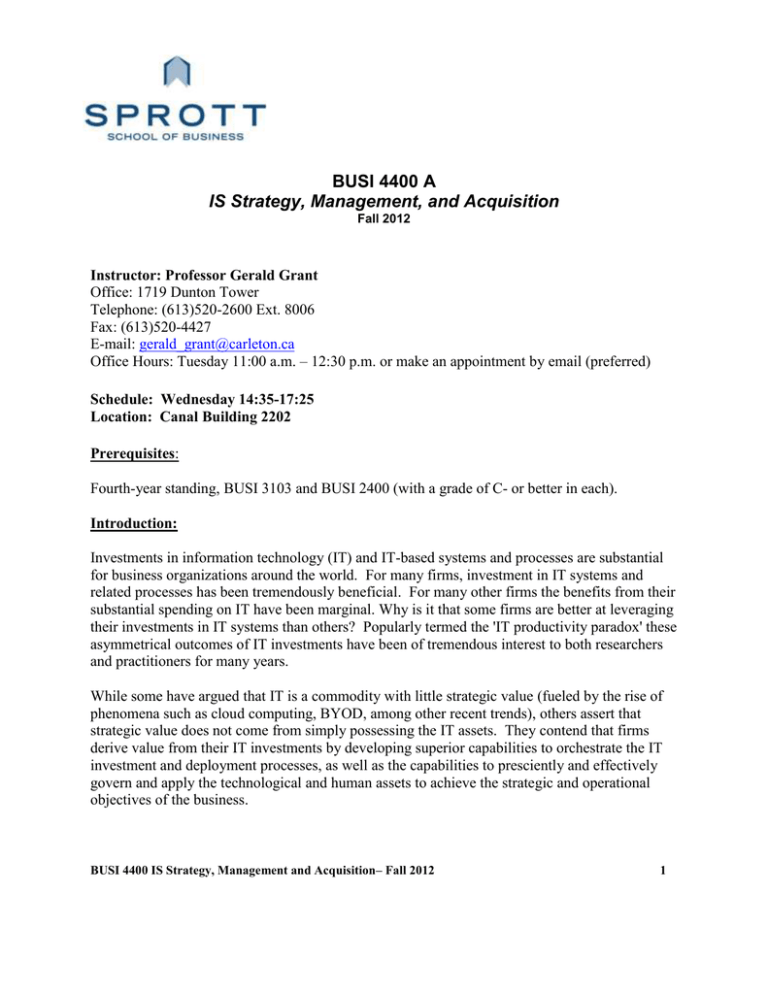
BUSI 4400 A
IS Strategy, Management, and Acquisition
Fall 2012
Instructor: Professor Gerald Grant
Office: 1719 Dunton Tower
Telephone: (613)520-2600 Ext. 8006
Fax: (613)520-4427
E-mail: gerald_grant@carleton.ca
Office Hours: Tuesday 11:00 a.m. – 12:30 p.m. or make an appointment by email (preferred)
Schedule: Wednesday 14:35-17:25
Location: Canal Building 2202
Prerequisites:
Fourth-year standing, BUSI 3103 and BUSI 2400 (with a grade of C- or better in each).
Introduction:
Investments in information technology (IT) and IT-based systems and processes are substantial
for business organizations around the world. For many firms, investment in IT systems and
related processes has been tremendously beneficial. For many other firms the benefits from their
substantial spending on IT have been marginal. Why is it that some firms are better at leveraging
their investments in IT systems than others? Popularly termed the 'IT productivity paradox' these
asymmetrical outcomes of IT investments have been of tremendous interest to both researchers
and practitioners for many years.
While some have argued that IT is a commodity with little strategic value (fueled by the rise of
phenomena such as cloud computing, BYOD, among other recent trends), others assert that
strategic value does not come from simply possessing the IT assets. They contend that firms
derive value from their IT investments by developing superior capabilities to orchestrate the IT
investment and deployment processes, as well as the capabilities to presciently and effectively
govern and apply the technological and human assets to achieve the strategic and operational
objectives of the business.
BUSI 4400 IS Strategy, Management and Acquisition– Fall 2012
1
Course Description:
Calendar description: Comprehensive treatment of current trends and management issues
associated with information systems within organizations of local, national, and international
scope. Issues and techniques of information systems planning, administration, resource
management, and new technology adoption. Case studies are used.
Expected Outcomes:
On completion of this course students are expected to have developed a deeper understanding of:
the key strategic issues facing managers seeking to deploy and exploit enterprise information
technology and systems.
issues behind the 'IT productivity paradox'.
the impact of the external environmental context on the strategic use of IT in organizations
the role enterprise information systems as enablers of organizational transformation.
the importance of managerial IT competence in managing the design, implementation and
exploitation of IT systems.
the key IS/IT resources that must be assembled and deployed in order to derive IT
performance benefits
the actions that managers should take to build organizational IS/IT capability.
Course Material and Additional Reading
The main textbook for this course is:
Austin, R.D., Nolan, R.L., and O’Donnell, S. (2009) Adventures of an IT Leader. Harvard
Business School Press, Cambridge (MA). ISBN-13: 978-1422146606
Additional Readings will be drawn from a variety of sources. These are listed in the course
schedule.
Supplementary Reading:
Students are encouraged to read the following textbooks for addition information.
Pearlson, K. E. and Saunders, C. S. (2013) Managing and Using Information Systems: A
Strategic Approach, Hoboken, NJ, John Wiley and Sons.
James D. McKeen and Heather Smith (2009) IT Strategy in Action
Publisher: Prentice Hall ISBN-10: 0136036317 ISBN-13: 9780136036319
McNurlin, B. C., Sprague, R. H. and Bui, T. (2009) Information Systems Management in
Practice, 8th Edition, Upper Saddle River, NJ: Pearson- Prentice Hall.
Alter, S. (2006) The Work Systems Method, Larkspur, CA: Work System Press.
Applegate, L., Austin, R. D. and McFarlan, F. W., (2007) "Corporate Information Strategy
and Management: Texts and Cases, Boston: McGraw-Hill Irwin, Seventh Edition.
BUSI 4400 IS Strategy, Management and Acquisition– Fall 2012
2
Online resources:
Magazines:
CIO, CIO Insight, Datamation, Baseline, Wired, Fortune, Information Week, Business Week,
Forbes, etc.
Course Procedures and Grading:
The course will primarily be based around cases and readings from the textbook as well as other
sources that illustrate key issues in information systems management. Students will be expected
to actively participate in the discussions and all associated class activities. The final course grade
will be derived as follows:
Individual case write-ups
Group Case Presentation
Class participation
Team project
Final Exam
Total
20%
10%
10%
20%
40%
100%
Class Participation:
Participation by students in class discussion and activities is an important part of this
course. Effective participation is possible only by regular class attendance, active pre-class
preparation, and online contributions as required. You should read the required case chapters
and readings before coming to class. You will not gain participation marks simply by asking an
obligatory question or two. Nor will such marks be based on the number of questions or
comments made. Participation grades will reflect the total impact the student has had on the
class over the term, through significant and insightful comments, and a demonstration of good
problem-solving and analytical skills.
Group Analysis of the IVK Corporation Case
As part of the learning experience in this course we will follow the exploits of Jim Barton, the
new CIO at IVK Corporation, as he struggles to understand his new role as CIO and manage the
challenges that the corporation faces in delivering value from IT investments. Each week,
students working in groups, will present an analysis of the relevant issues being faced by Jim and
his team as described in the chapters assigned for that week from the book Adventures of an IT
Leader.
BUSI 4400 IS Strategy, Management and Acquisition– Fall 2012
3
The presenting group is expected to synthesize the chapters assigned, identifying and discussing
the main issues raised, and the core problem(s) to be addressed. The issues and problems should
then be thoroughly analyzed (not just described again). The analysis should employ theoretical
ideas presented in class or relevant readings (those assigned and others deemed relevant by the
group). Alternative courses of action, recommendations, and implementation suggestions should
be presented. The presenting team will submit a write-up of the case prior to the start of class on
the day of presentation. The write-up should not exceed ten (10) pages (double-spaced). In
doing the presentation the team is expected to use a variety of strategies that will encourage class
participation (example: debates, dramatization, etc.). Credit will be given for creativity in
presenting the case.
Individual Assignment (usually weekly)
Each week a series of discussion points or questions will be posted. Each student will be
required to do individual write-ups (consisting of 2-3 double-spaced pages) of four (4) of the
discussion points/questions posted throughout the semester. The objective is to have students
give due consideration to the issues emanating from the IVK case and help them prepare for the
class discussion. Well thought out and written responses are expected. Students will be assigned
to answer a particular question/discussion issue for two (2) of the four (4) assignments. The
assignments will be made when the class list is known. You may not write up an individual
question on the same case/topic your group is presenting. You also may not write-up more
than one question per week. There will be no make-up papers for those missed. Late
submission of individual assignments will not be accepted after discussion on the topic has taken
place in class. Please check the individual assignment evaluation criteria for guidance.
Team Project
Students will be required to form into project teams of three people. The teams will conduct a
case study of an information system in an organization of their choice. The case study should
focus on a particular issue or theme related to the implementation or use of a system. Issues
include strategic planning, IT governance, project management, IT service management, change
management, post implementation performance review, training, among others. Students are
required to conduct background research and interview at least three people in an organization
regarding the issue of interest. Ideally interviews should be conducted with both IT and business
personnel.
Each team will prepare a write-up of the case consisting of no more 5000 words. Teams will then
make a presentation of their case studies to the entire class at a time to be assigned. The case
studies should be analytical and go beyond a mere description of the situation in the
organizations. They should emphasize the strategic issues being tackled and include
recommendations on how key challenges or opportunities might be addressed.
Project deliverables:
Deliverables for the team project include the following: a project proposal, project report, project
presentation, and a peer evaluation.
BUSI 4400 IS Strategy, Management and Acquisition– Fall 2012
4
a. The proposal should provide a brief background (1 page) on the issue that has been
assigned. It should contain the following: a title for the project, background and rationale,
possible sources of information and resources that may be needed, and a project schedule.
I will review each project proposal. The proposals must be submitted by the third class
meeting.
b. The project report should be constructed as a business report. It should have a title page,
an executive summary page, a table of contents and figures, the report itself, and
appropriate appendices and illustrations. It should not be more that 5000 words in length,
excluding appendices and illustrations.
c. Each team will give an in-class presentation of its project lasting no more than 15
minutes. This will consist of 12 minutes for the actual presentation and 3 minutes for
questions. The limited presentation time makes it imperative for the group to organize
what is to be presented. Visual aids should be used to enliven the presentations. However,
these must be well designed and clear. All team members should take part in the
presentation
d. Each student will be required to take part in two peer evaluation exercises. One of the
project team presentations and one of his or her peers’ involvement and performance in
the project team. The evaluation of the presentation should be submitted at the end of the
class session in which the presentation was given. The evaluation of team member
involvement and performance in the project preparation should be submitted separately to
the teacher. If the evaluation is not submitted, up to 5% of the project grade will be
deducted.
e. The project submitted should be original work. A group that submits a project that is not
original work will get a final class grade of Zero (0) and be subject to university policy
regarding instructional offenses.
Summary of Deliverables
Deliverable
Submit to
Due Date
1
4
Project Proposal
Individual Case Write-up
Professor
Professor
1
Case Presentation
Professor
1
1
2-3
Final Project
Project Group Peer Evaluation
Project presentation peer
evaluation
Final Exam
Professor
Professor
Professor
3rd week of class
By 12:00 noon. on assigned
date
At the start of class on assigned
date.
December 28, 2012
December 28, 2012
December 28, 2012
Professor
As scheduled
1
BUSI 4400 IS Strategy, Management and Acquisition– Fall 2012
% of
Grade
20
10
20
40
5
Assignment Submission
All written assignments including the group project should be submitted to the Professor by
12:00 noon via cuLearn, on the day they are due. The assignments should be submitted in .pdf
format. No printed document is required. All documents should have the student’s name,
number, email address and course section.
It is the student’s responsibility to ensure that all assignments are received in an accessible
format on or before the due date. Assignments are due at the time indicated. Late assignments
will be marked down by 10% for every calendar day late.
BUSI 4400 IS Strategy, Management and Acquisition– Fall 2012
6
BUSI 4400 Management of Information Systems
Tentative Class Schedule
Dates
Topic
Cases*
Sept 12
Introduction and Class
Organization
Key issues in information systems
Management
Articles:
Luftman, J. N. and Ben-Zvi, T. (2011) Key
Issues for IT Executives 2011: Cautious
Optimism in Uncertain Times, MIS
Quarterly Executive 10(4) December: 203212.
Austin, Nolan, & O’Donnell (2009)
Chapters 1, 2 and 3
19
Leading IT in a dynamic global
environment – The Changing
Role of the CIO
Guest Speaker:
Readings/Assignme
nt (Library
Reserve)
Practitioner’s Perspective
CIO Priorities 2012: Gartner
Assignment #1
IVK Case (All
students)
The Essential CIO: Insights from Global
Chief Information Officer Study. IBM,
2011.
CIO Role In 2013: Four-Headed Monster? By Eric
Lundquist, InformationWeek
August 14, 2012
URL: http://www.informationweek.com/global-cio/interviews/cio-rolein-2013-four-headed-monster/240005431
ComputerWeekly CIO Interviews
http://www.youtube.com/watch?v=noIcSEleQ_Y&feature=endscreen&N
R=1
Mahindra Satyam’s CIO
http://www.youtube.com/watch?v=noIcSEleQ_Y&feature=endscreen&N
R=1
Ingram Micro’s CIO
http://www.youtube.com/watch?v=E1btHV4Un7c&feature=related
Avon’s CIO
http://www.youtube.com/watch?v=0pGROTvT780&feature=endscreen
26
Understanding IT Value Delivery
in Organizations
Austin, Nolan, & O’Donnell (2009)
Chapters 4 and 5
Assignment 2
IVK Case – Group 1
Carr, Nicholas G. (2003) IT Doesn’t
Matter, Harvard Business Review, 81(5)
May:41-49
Group project
proposal due
Nicolas Carr’s discusses his ideas on “IT doesn’t matter”
http://www.youtube.com/watch?v=PO2dCaaSDk8&feature=related
Farrell, D. (2003) The Real New
Economy, Harvard Business Review,
October, pp. 105-112.
October 3
Setting the Strategic Direction for
Information Systems Investment
Grant, G. G. (2010) Editorial:
Reconceptualizing the concept of business
and IT alignment: from engineering to
agriculture, European Journal of
Information Systems, 19, pp. 619-624.
No case today
Finding the Strategy Gaps
Avoiding Alignment Traps
http://resultsbrief.bain.com/videos/0711/index.htm
10
Delivering IT Services, Systems,
and Applications
Austin, Nolan, & O’Donnell (2009)
Chapters 6 and 7
Assignment #3
IVK Case – Group 2
An Introductory Overview of ITIL Version 3
Cooper, R. The Stage-Gate Idea-to-Launch process
http://www.stage-gate.net/downloads/working_papers/wp_30.pdf
BUSI 4400 IS Strategy, Management, and Acquisition – Fall 2012
7
Dates
Topic
Cases*
17
Governing IT Service Delivery
24
Managing Performance and Risk
October 31
Managing IT-enabled
organizational change
Austin, Nolan, & O’Donnell (2009)
Chapters 8 & 9
Grant, et al. (2007) An extended model of
IT governance: a conceptual proposal,
proceedings of the Americas Conference
on Information Systems.
Austin, Nolan, & O’Donnell (2009)
Chapters 10, 11, and 17.
Smith H. and McKeen, J. (2009) A
Wholistic Approach to Managing IT-based
Risk
http://aisel.aisnet.org/cgi/viewcontent.cgi?
article=3492&context=cais
Austin, Nolan, & O’Donnell (2009)
Chapters 12.
Building and managing the IT
infrastructure
Markus, M. L. and Benjamin, R. I. (1997).
"The magic bullet theory in IT-enabled
transformation." Sloan Management
Review, (Winter): 55-68. (obtain through
Carleton Library online services)
Austin, Nolan, & O’Donnell (2009)
Chapters 13 and 16
7
Readings/Assignme
nt (Library
Reserve)
Assignment #4
IVK Case – Group 3
Practitioner’s Perspective
An Executive View of IT Governance
Why IT Governance should fall to the board
IT Portfolio Management http://cisr.mit.edu/research/researchoverview/classic-topics/it-portfolio-management/
Assignment #5
IVK Case – Group 4
Zappos Breach: 8 Lessons Learned
http://www.informationweek.com/news/security/attacks/232400457
Assignment #6
IVK Case – Group 5
Assignment #7
IVK Case – Group 6
IT Priorities in the Downturn
http://www.computerweekly.com/news/2240117393/IT-Priorities-Feature
Emerging Technologies – Jack Shaw
http://www.youtube.com/watch?v=9iQbt0uNwz0&feature=related
Andriole, Stephen J. (2012) "Seven
Indisputable Technology Trends That Will
Define 2015," Communications of the
Association for
Information Systems: Vol. 30, Article 4.
Available at:
http://aisel.aisnet.org/cais/vol30/iss1/4
CIOs discus cloud computing
http://www.youtube.com/watch?v=C9WYyO2FKrU
Nicolas Carr on cloud computing
http://www.youtube.com/watch?v=7ymafpmWBA8&feature=related
http://aisel.aisnet.org/cgi/viewcontent.cg
i?article=3646&context=cais
14
Managing IT Sourcing
Austin, Nolan, & O’Donnell (2009)
Chapters 14.
Assignment #8
IVK Case – Group 7
Stephanie Overby CIO Online Fri, August 17, 2012
Cloud Service Providers Challenge Traditional IT Outsourcing
http://www.cio.com/article/714042/Cloud_Service_Providers_Challenge_
Traditional_IT_Outsourcing?taxonomyId=3195
21
Managing IT Talent
Austin, Nolan, & O’Donnell (2009)
Chapters 15.
McKeen, J, and Smith, H.A.
(2009)Developments in Practice:
Successful Strategies for IT Staffing,
Communications of the AIS, 24(1) #46
http://aisel.aisnet.org/cgi/viewcontent.cgi?
article=3443&context=cais
IVK Case –All
students
Deliotte: Mind the talent gap
http://www.deloitte.com/assets/DcomCanada/Local%20Assets/Documents/Consulting/ca_consulting_Mindthe
Gap.pdf
28
Project Presentations
BUSI 4400 IS Strategy, Management, and Acquisition – Fall 2012
8
Dates
Topic
Cases*
Readings/Assignme
nt (Library
Reserve)
Practitioner’s Perspective
All Projects Documents Due
Today
TBA
Final Examinations
* Cases may be adjusted depending on class registration.
BUSI 4400 IS Strategy, Management, and Acquisition – Fall 2012
9
IMPORTANT ADDITIONAL INFORMATION
Required calculator in BUSI course examinations
If you are purchasing a calculator, we recommend any one of the following options: Texas Instruments
BA II Plus (including Pro Model), Hewlett Packard HP 12C (including Platinum model), Staples
Financial Calculator, Sharp EL-738C & Hewlett Packard HP 10bII
Group work
The Sprott School of Business encourages group assignments in the school for several reasons. They
provide you with opportunities to develop and enhance interpersonal, communication, leadership,
follower-ship and other group skills. Group assignments are also good for learning integrative skills for
putting together a complex task. Your professor may assign one or more group
tasks/assignments/projects in this course. Before embarking on a specific problem as a group, it is your
responsibility to ensure that the problem is meant to be a group assignment and not an individual one.
Medical certificate
Please note that in all occasions that call for a medical certificate you must use or furnish the information
demanded in the standard university form. http://www2.carleton.ca/registrar/forms/
Persons with disabilities
Students with disabilities requiring academic accommodations in this course must register with the Paul
Menton Centre for Students with Disabilities (PMC) for a formal evaluation of disability-related needs.
Documented disabilities could include but are not limited to mobility/physical impairments, specific
Learning Disabilities (LD), psychiatric/psychological disabilities, sensory disabilities, Attention Deficit
Hyperactivity Disorder (ADHD), and chronic medical conditions. Registered PMC students are required
to contact the PMC, 613-520-6608, every term to ensure that I receive your Letter of Accommodation, no
later than two weeks before the first assignment is due or the first in-class test/midterm requiring
accommodations. If you only require accommodations for your formally scheduled exam(s) in this
course, please submit your request for accommodations to PMC by the deadlines published on the PMC
website.
Religious observance
Students requesting academic accommodation on the basis of religious observance should make a formal,
written request to their instructors for alternate dates and/or means of satisfying academic requirements.
Such requests should be made during the first two weeks of class, or as soon as possible after the need for
accommodation is known to exist, but no later than two weeks before the compulsory academic event.
Accommodation is to be worked out directly and on an individual basis between the student and the
instructor(s) involved. Instructors will make accommodations in a way that avoids academic
disadvantage to the student. Students or instructors who have questions or want to confirm
accommodation eligibility of a religious event or practice may refer to the Equity Services website for a
list of holy days and Carleton's Academic Accommodation policies, or may contact an Equity Services
Advisor in the Equity Services Department for assistance.
Pregnancy
Pregnant students requiring academic accommodations are encouraged to contact an Equity Advisor in
Equity Services to complete a letter of accommodation. The student must then make an appointment to
BUSI 4400 IS Strategy, Management, and Acquisition – Fall 2012
10
discuss her needs with the instructor at least two weeks prior to the first academic event in which it is
anticipated the accommodation will be required.
Plagiarism
The University Senate defines plagiarism in the regulations on instructional offenses as: "to use and pass
off as one's own idea or product work of another without expressly giving credit to another."
Borrowing someone else's answers, unauthorized possession of tests or answers to tests, or possession of
material designed in answering exam questions, are also subject to university policy regarding
instructional offences. For more information on Carleton University's Academic Integrity Policy, consult:
http://www1.carleton.ca/studentaffairs/academic-integrity/
Important Dates & Deadlines - Fall Term 2012
September 1, 2012
Last day for receipt of applications from potential fall (November) graduates.
September 3, 2012
Statutory holiday, University closed.
September 4, 2012
Fall term begins.
September 4-5, 2012
Academic Orientation. All students are expected to be on campus. Class and laboratory
preparations departmental introductions for students and other academic preparation activities
will be held.
September 5, 2012
Orientation for Teaching Assistants.
September 6, 2012
Fall and fall/winter classes begin.
September 19, 2012
Last day for registration.
Last day to change courses or sections for fall/winter and fall term courses.
September 30, 2012
BUSI 4400 IS Strategy, Management, and Acquisition – Fall 2012
11
Last day to withdraw from fall term and fall/winter courses with a full fee adjustment.
Last day for receipt of applications for review of final grades in summer term courses.
September 28-29, 2012
Summer deferred final examinations to be written.
October 5, 2012
University Day at Carleton. Undergraduate classes suspended.
December examination schedule (fall term final and fall/winter mid-terms) available online.
October 8, 2012
Statutory holiday, University closed.
October 15, 2012
Last day for receipt of applications for admission to a degree program for the 2013 winter term
from applicants whose documents originate from outside Canada or the United States.
November 9, 2012
Last day to submit, to the Paul Menton Centre for Students with Disabilities, Formal Examination
Accommodation Forms for December examinations.
November 15, 2012
Last day for receipt of applications for admission to a degree program for the winter term.
November 19, 2012
Last day for tests or examinations in courses below the 4000-level before the final examination
period (see Examination Regulations in the Academic Regulations of the University section of
this Calendar).
December 1, 2012
Last day for receipt of applications from potential winter (February) graduates.
December 3 (Monday), 2012
Fall term ends.
Last day of fall-term classes.
Last day for academic withdrawal from fall term courses
BUSI 4400 IS Strategy, Management, and Acquisition – Fall 2012
12
Last day for handing in term work and the last day that can be specified by a course instructor as a
due date for term work for fall term courses.
Last day for receipt of applications for degree program transfers for winter term.
Last day for receipt of applications for admission to a degree program for the 2013 winter term.
December 4-5, 2012
No classes take place.
December 5, 2012
Last day for receipt of applications for degree program transfers for winter term.
December 6-19, 2012
Final examinations in fall term courses and mid-term examinations in fall/winter courses may be
held. Examinations are normally held in the day and evening during the Monday to Saturday
period .In exceptional circumstances, it may be necessary to schedule an examination on a
Sunday.
December 16, 2012
Fall Co-op Work Term Reports due.
December 20, 2012
All take home examinations are due.
December 24, 2012 to January 1, 2013
University closed.
BUSI 4400 IS Strategy, Management, and Acquisition – Fall 2012
13

